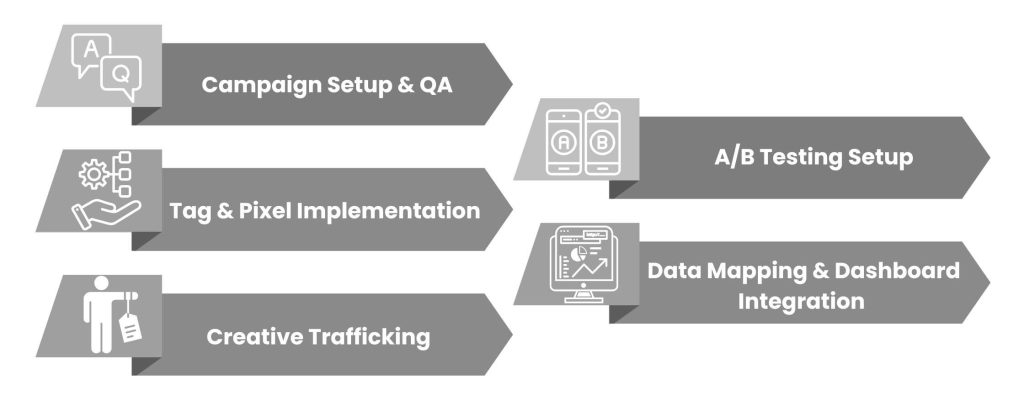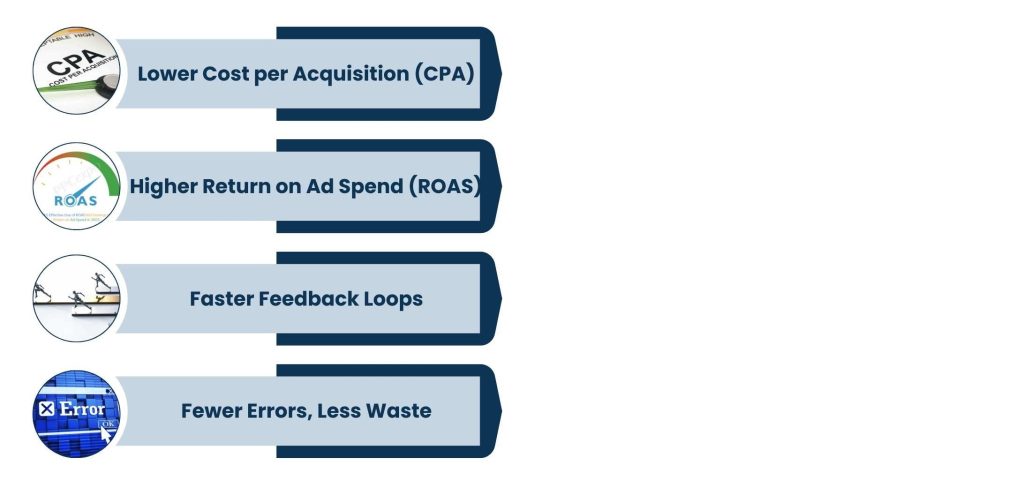Introduction
Running ads in 2025 isn’t what it used to be.
You’ve got a dozen platforms to manage, stricter privacy rules, fragmented data, and a million things that can go wrong between launch and reporting. And yet, many businesses still expect media buyers to do it all from strategy and creative to pixel QA and dashboard setup.
That’s where Ad Operations Specialists come in — and where true ROI starts.
These behind-the-scenes experts don’t just ensure your ads get published — they ensure ads are trackable, testable, optimizable, and profitable. If your paid media budget is bloated, chaotic, and underperforming, chances are that you don’t have strong ad ops.
Let’s take a closer look at who they are, what they do, and why your campaigns will perform better with them.
What Are Ad Operations Specialists And What Do They Do?
An Ad Operations Specialist is the engine room of your paid media workflow. While media strategists focus on big-picture planning and creative craft messaging, ad ops ensure the entire machine runs without friction. They’re the technical backbone of performance marketing, connecting the dots between platforms, pixels, analytics, and actual results.

Here’s what their role typically includes, with a deeper look at why each task matters:
🔧 Setting Up Campaigns Across Platforms:
Whether it’s Meta, Google, TikTok, LinkedIn, or programmatic platforms like DV360, ad ops specialists manage the actual build, ensuring everything follows naming conventions, budget pacing is correct, and placements are aligned with the media plan. A tiny setup error can derail performance, so precision here is key.
📌 Implementing Pixels and Firing Tags:
Every ad click needs to be tracked. That means properly installing pixels, custom events, and conversion tags — often through tools like Google Tag Manager. Ad ops test these thoroughly to ensure attribution is working and retargeting lists are populating as expected.
🔍 QA for Creatives, Placements, and URLs:
Before a campaign goes live, ad ops reviews every element — from headline spelling to URL structure to device compatibility. This reduces the chance of wasting spend on broken links, off-brand creatives, or misaligned ad copies.
🧪 Managing A/B Testing Setup:
A/B tests can generate powerful insights — but only if they’re structured and tracked correctly. Ad ops ensure creative variations are named properly, traffic is evenly split, and test results can be trusted.
📊 Syncing Data with Dashboards:
Performance data doesn’t just live in one place. Ad ops map platform data to analytics tools, dashboards, or BI systems — ensuring marketers have a real-time, unified view of campaign performance.
🛠️ Troubleshooting Discrepancies Across Platforms:
Why does Meta show 300 conversions, but GA4 only shows 180? Ad ops investigate tracking inconsistencies, cross-platform lag, attribution windows, and other technical factors, giving clarity to data confusion and preventing misinformed decisions.
While ad ops may not “optimize” campaigns directly, their work provides the clean, trustworthy data that powers smart optimization. Without them, your media strategy is running on guesswork.
Why Ad Ops Is Crucial for ROI in 2025
Ad platforms are more powerful than ever — but they’re also more fragile. With constant changes in privacy policies, attribution windows, and data access, it’s harder than ever to run profitable campaigns without serious technical oversight.
That’s why Ad Operations Specialists are no longer optional. They are the ones who make sure the engine behind your paid media is clean, fast, and efficient.

Let’s break down how they directly influence ROI:
📉 Broken tracking = broken attribution:
If your Meta pixel isn’t firing or GA4 is misaligned with your ad spend, you won’t know which campaigns are working. And if you don’t know what’s working, you’ll keep pouring your budget into the wrong channels. Ad ops prevent this by validating every conversion event and troubleshooting any discrepancies early.
💸 Wasted spend from poor setup:
It takes one unchecked campaign to burn through thousands. A duplicated audience, a misconfigured geotarget, or a missed budget cap can quietly sabotage performance. Ad ops run pre-launch checklists to ensure everything from creative IDs to targeting specs is dialed in — preventing waste before it starts.
⏱️ Slow reporting = slow decisions:
In fast-moving campaigns, waiting days for data means losing ground. Ad ops keep dashboards updated and synced so media buyers can make informed calls daily, not weekly — allowing for quicker testing, scaling, or pausing.
⚠️ Inaccurate data = bad decisions:
Without accurate data, even the smartest strategy is built on guesswork. Ad ops ensure naming conventions, UTMs, pixels, and platforms are aligned so that the numbers you see reflect what’s happening.
📊 Clean data = clear ROI:
When tracking, QA, and structure are rock solid, your team isn’t debating metrics — they’re acting on them. That clarity enables smarter budget allocation, better creative insights, and more profitable campaigns.
Bottom line? Ad ops isn’t just helpful — it’s foundational to getting real returns from your ad spend in 2025 and beyond.
Also Read: Virtual Assistant Services in Bilbao
How Ad Ops Supports Paid Media Teams
Ad ops isn’t a “nice-to-have.” It’s what keeps your campaigns from falling apart mid-flight.

Here’s how they work behind the scenes to support your entire paid media function:
1. Campaign Setup & QA :
Ad ops ensures every new campaign is built with precision. They review naming conventions, audience selection, placements, and goals before launch. This means fewer errors, cleaner data, and faster turnaround.
2. Tag & Pixel Implementation:
From Meta to TikTok to Google Ads, they handle pixel installation and event configuration. They test events in real-time and confirm they’re firing properly which is crucial for accurate attribution and remarketing.
3. Creative Trafficking:
They upload and organize ad creatives across platforms, ensuring the right messages appear in the right formats, to the right audiences. No mismatched headlines or broken URLs.
4. A/B Testing Setup:
Want to test headlines, creatives, or landing pages? Ad ops handles the setup, naming, and tracking — so the data you get is clean and actionable.
5. Data Mapping & Dashboard Integration:
They sync campaign performance with reporting tools like Google Looker Studio, Tableau, or client-facing dashboards. They ensure data flows consistently and matches between platforms.
By managing these tasks, Ad Operations Specialists allow media buyers to focus on scaling campaigns, not troubleshooting problems.
Common Mistakes Businesses Make Without Ad Ops
Ad ops can seem like something to skip altogether a way to cut costs or save time, particularly for lean teams or startups. But the lack of ad ops support does not typically accumulate efficiencies, as much as misfires and revenue leakage.

Here are the most common (and costly) pitfalls that happen when Ad Operations Specialists aren’t part of the equation:
1. Media Buyers Are Stretched Thin:
In many companies, media buyers are expected to do everything — strategy, execution, reporting, QA, and troubleshooting. This not only burns them out but also dilutes focus. When one person is managing 20 ad sets and trying to QA every creative, performance suffers. The strategy needs clear headspace — not distractions from pixel issues and trafficking errors.
2. QA Gets Skipped:
Without a second set of eyes, mistakes slip through — and those mistakes cost real money. A wrong URL can send users to the homepage instead of a high-converting landing page. A broken UTM tag can lose critical attribution. Ad ops ensure campaigns are thoroughly reviewed before launch, reducing preventable errors.
3. No Source of Truth for Performance:
If one report says a campaign drove 50 conversions and another says 120, who’s right? Disconnected platforms, inconsistent naming, and misaligned attribution models lead to conflicting data. Ad ops build a unified framework so your performance metrics are reliable and your team can act confidently.
4. Slow Issue Resolution:
When tracking breaks mid-campaign, every minute counts. Without a dedicated person monitoring data flow and diagnostics, teams waste hours trying to figure out what’s broken. Ad ops specialists can spot the issue quickly, test it, and escalate a fix, keeping performance on track and clients happy.
These gaps don’t just hurt results — they break trust, delay insights, and create operational drag. A strong ad ops function isn’t overhead. It’s an investment in cleaner execution and stronger ROI.
The Impact on ROI: What Happens When Ad Ops Is Done Right
When Ad Operations Specialists are integrated into your workflow, the impact goes far beyond smoother execution. They help your paid media campaigns operate with precision, and precision translates to profit.

Here’s how strong ad ops directly boost ROI:
1. Lower Cost per Acquisition (CPA):
Clean tracking helps identify what’s driving conversions — not just what looks good in-platform. By identifying high-performing segments earlier, you can stop wasting your budget on audiences or creatives that aren’t delivering. That alone can shave 15–30% off your CPA.
2. Higher Return on Ad Spend (ROAS):
With properly configured UTM parameters, consistent naming conventions, and cross-platform attribution alignment, ROAS becomes more than just a guess. Ad ops ensures the numbers you’re optimizing toward are accurate, which helps you make better investment decisions faster.
3. Faster Feedback Loops:
When dashboards are integrated and automated, you’re not waiting for a weekly report to make changes. Ad ops gives your team daily clarity, allowing rapid adjustments that compound performance over time.
4. Fewer Errors, Less Waste:
A misfiring pixel, wrong link, or broken creative rotation can quietly burn through thousands of dollars. Ad ops QA catches these issues before launch — saving budget, time, and client trust.
Conclusion
Paid media has never moved faster — or cost more. With platforms evolving constantly, privacy regulations tightening, and attribution getting murkier, businesses can’t afford to run campaigns on hope and high-level strategy alone.
Ad Operations Specialists are the difference between campaigns that launch and campaigns that scale. They bring control to chaos. They eliminate waste before it happens. And most importantly, they give marketing teams the data clarity and execution support needed to optimize faster and more effectively.
This role is often misunderstood — or worse, completely overlooked — but the smartest performance teams know better. They invest in the operational layer that keeps everything aligned, accurate, and accountable.
Ad ops is a strategic edge whether you are an agency scaling multiple ad accounts, an in-house team managing cross-platform budgets, or a consultant who simply wants to provide better results for your clients.
Zero in on Operations–If your goal is to maximize ROI, minimize waste, and make your team more efficient. No matter how brilliant your media strategy is, it can’t perform if it’s not backed by flawless execution.
About Us
Tasks Expert offers top-tier virtual assistant services from highly skilled professionals based in India. Our VAs handle a wide range of tasks, from part time personal assistant to specialized services like remote it support services, professional bookkeeping service etc. Furthermore, it helps businesses worldwide streamline operations and boost productivity.
Ready to elevate your business? Book a Call and let Tasks Expert take care of the rest.









